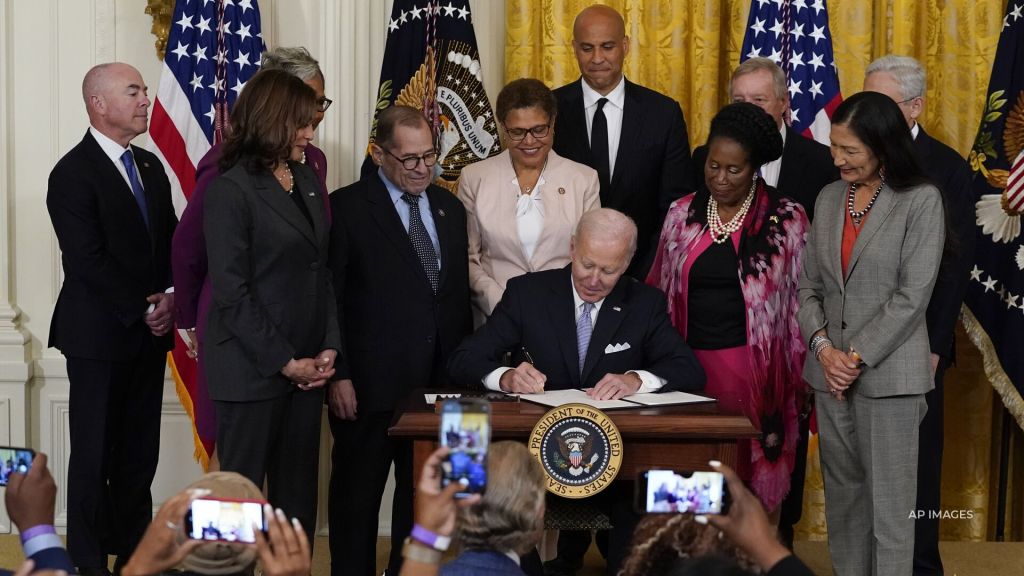On Wednesday, President Joe Biden signed an executive order aimed at improving accountability in policing. The measure is in response to the murder of George Floyd at the hands of Minneapolis Police officers and was signed on the second anniversary of Floyd’s death.
“I know progress can be slow and frustrating,” Biden said. “Today we’re acting. We’re showing that speaking out matters. Being engaged matters. That the work of our time, healing the soul of this nation, is ongoing and unfinished and requires all of us never to give up.”
Supporters see Biden’s Advancing Effective, Accountable Policing and Criminal Justice Practices to Enhance Public Trust and Public Safety Order as a meaningful but limited action, highlighting the challenges to address racism, excessive use of force and public safety while Congress remains deadlocked on multiple issues.
“While this action does not have the long-term impact that we had hoped for,” Floyd family lawyer Ben Crump said in a statement, “it does represent incremental progress, and we need to commit ourselves to making progress every day.”
Biden’s executive order comes at a time when violent crime rates across the country are rising, police applications are falling, and several months of a measure on police reform failed to gain traction in the Senate.
The bulk of Biden’s order focuses on federal law enforcement agencies, and will, in part, require them to review and revise policies on use of force. It will also create a database to help track officer misconduct.
But the executive order doesn’t extend to local law enforcement agencies, so the Biden Administration can’t require local participation in the database. According to the White House, the database is intended to prevent problem officers from hopping from job to job. Officials are looking for ways to use federal funding to encourage cooperation at the local level. In addition, the order is designed to restrict the flow of surplus military equipment to local police.
The order also assesses the impact of facial recognition software on civil liberties, looks for ways to reduce the spread of COVID-19 in federal correctional facilities and suggests better ways to collect data on police practices.
The International Association of Chiefs of Police and the Fraternal Order of Police both worked with the Biden administration on the order. They said that they “see many components of the order as a blueprint for future congressional action.”
Not everyone was so convinced.
“President Biden’s executive order is a poor excuse for the transformation of public safety that he promised the Black voters who put him in office,” the Movement for Black Lives, a civil rights group, said in a statement.
In an interview with Fox News Digital, the National Sheriff’s Association President Sheriff Vernon Stanforth said his organization was not consulted by the Biden administration in crafting the action.
“There are potentially elements of this Order that make sense and could be beneficial to all law enforcement,” Stanforth said. “However, Sheriffs are disappointed that the President chose opaqueness over transparency in drafting this order. By choosing not to listen to elected law enforcement the President missed hearing from the rest of the Country. Unfortunately, [he] hand-picked who he and his staff would share the actual verbiage with and who they would take input from. Law enforcement operates in every county in America, not just in East and West coast cities.”
Sen. Cory Booker (D-NJ) helped the Biden Administration craft the order. He said it will enhance transparency, accountability and policing standards. But he noted that additional efforts will be needed for the police to improve relationships with the people they are to protect and serve.
“Across the United States, there is a deficit of trust between law enforcement and the communities they are sworn to protect – particularly Black and brown communities,” Booker said.
Biden isn’t the first president in recent memory to sign an executive order on police reform. President Trump signed a similar order less than a month after Floyd’s death in 2020 aimed at curbing police brutality. Trump’s order provided federal dollars to departments that met certain credentialing standards on the use of force. One of the elements of the order called for the establishment of a database tracking terminations, criminal convictions and civil judgments against law enforcement officers for excessive use of force.
President Barack Obama also tried to push for police reform through a task force he formed in 2014. One of that task force’s recommendations was an expansion of an already existing database of officers who had been decertified.
The Associated Press contributed to this article.
